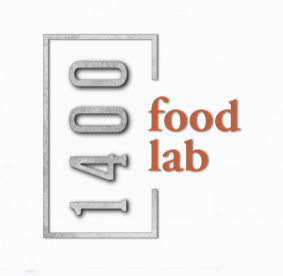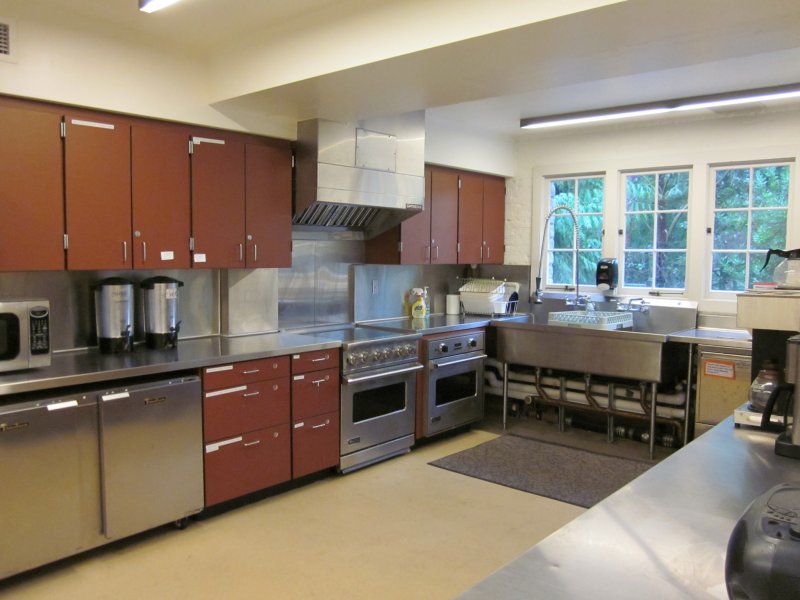Neighborhood food businesses can provide significant benefits for the local economy in the form of jobs, local retention of wealth, and amenities for local residents. However, budding businesses may face challenges such as lack of capital and technical knowledge. A neighborhood food business incubator can help businesses overcome these challenges and start off on the right foot, improving their chances of success and amplifying their positive impact in the community.
(Image credit: Seattle Parks)
Idea
Did you know that the food eaten by Whitehall residents travels more than 1500 miles before it is consumed (Pirog, 2001)? Wouldn't the system be more sustainable if some of the food eaten by Whitehall residents could be grown and processed right here in Whitehall? Increased reliance on the local food system has the potential to save energy and reduce pollution and road congestion, and it is also powerful strategy for economic development that creates wealth and fosters social equity. A neighborhood food business incubator is a powerful tool for the development of a robust local food system.
What are neighborhood food businesses?
Neighborhood food businesses may include urban farms, restaurants, markets, and food processing and distribution operations. They create jobs, produce tax revenue, and create products and amenities for residents and visitors (Local Food Action Plan Team, 2016, p. 78). Ideally, these businesses will be operated by local entrepreneurs, will employ local residents, and will participate in local markets, resulting in an economic multiplier effect (Martinez, 2010). Running a food business is not a task for the faint of heart. Food businesses must deal with the same startup challenges faced by businesses in other industries, such as locating a suitable work space, procuring equipment, hiring labor, developing supply chains, and cultivating expertise. But they must also deal with unique barriers such as zoning, permitting, regulation, and sanitation. It's no surprise that 50 percent of small food businesses fail within 5 years (Hot Bread Kitchen, n.d.). This is where a neighborhood food business incubator can help.
What is a food business incubator?
A food business incubator helps new food businesses deal with these challenges by providing relevant expertise and access to shared workspaces, equipment, and even labor. For example, an entrepreneur interested in producing salsa could work with the incubator to identify funding sources, navigate regulatory requirements, and connect with nearby producers of tomatoes, corn, onions, and peppers. Until the business is ready for its own brick-and-mortar establishment, the entrepreneur might also rent time in the incubator's licensed commercial kitchen and hire the incubator's trained food service staff as contract labor. Eventually, the business “graduates” and is able to operate independently of the incubator.
Food business incubators come in a variety of forms, but most are for-profit or not-for-profit firms. They receive income from a variety of sources including user fees, dividends from equity in member firms, resale of goods produced by members, donations, and grants. Incubators may host up to 51 businesses, which tend to have a disproportionately high level of minority, female, and low-income owners. Regarding the incubator itself, research shows that 84% percent break even or make money, and 81% are self-sustaining with no reliance on grants. Regarding incubator members, 86% graduate and achieve independence (Econsult Solutions, 2013). Over 200 kitchen incubators and 65 farm incubators are operating in the U.S. and Canada (National League of Cities, 2017), proving that success is possible. Municipal governments don't typically operate incubators directly, however there are actions governments can take to encourage the creation of an incubator and help ensure its success. Specific recommendations for creation of a food business incubator in Whitehall are included below.
Goal
Establish a neighborhood food business incubator (a not-for-profit corporation) committed to helping low-income and minority Whitehall residents create and grow food businesses within the city limits. To this end, the incubator should seek to improve entrepreneur access to the following resources:
- Administrative work space
- Commercial kitchen space and equipment
- Technical expertise
- Business expertise
- Funding sources
- Local labor
- Local markets
- Local real estate
- Marketing resources
Strategies
The National League of Cities identifies the following actions that municipalities can take to support a food business incubator (National League of Cities, 2017):
- Convene and motivate key partners
- Assist with securing infrastructure or land, and help fund startup costs.
- Focus the incubator program on underserved residents.
- Encourage the integration of production and distribution services into the incubator model.
- Provide technical assistance on the business regulation process.
- Use the zoning code to support agriculture and food-based retail.
- Connect food entrepreneurs to your city's startup ecosystem networks.
- Purchase food from incubator graduates.
The following subsections provide additional detail regarding how Whitehall can pursue these actions.
Convene and motivate key partners
Starting an incubator is a major endeavor that will require many resources. However, because neighborhood food businesses have the potential to benefit the economy, the environment, and individuals in the community, the concept is likely to be attractive to a variety of partners. The City of Whitehall can play a critical role by bringing these partners together and providing an agenda for initial discussions.
Potential partners may include:
- Businesspeople and entrepreneurs (e.g. Whitehall Chamber of Commerce)
- Food-related organizations (e.g. Local Matters, OSU Extension)
- Poverty-related organizations (e.g. Victory Ministries)
- Economic development organizations (e.g. Economic Community Development Institute, SCORE Columbus
- Real-estate organizations and commercial property realtors (e.g. Central Ohio Community Improvement Corporation)
- Educational and vocational training institutions (e.g. Whitehall City Schools, [Columbus State Community College](https://www.cscc.edu/, Eastland-Fairfield Career Center)
- Service organizations (e.g. Lions, Kiwanis, Rotary)
Assist with securing infrastructure or land, and help fund startup costs.
City officials and staff have contacts, expertise, and assets that may not be available to other partners. City staff could identify potential locations for the incubator. Potential location candidates may include:
- Existing kitchens or administrative space available for lease
- Vacant buildings that could be repurposed as kitchen or administrative space
- Parcels owned by the county landbank that could house a new structure or urban farm
- Local businesses or institutions (e.g. churches) with idle land or excess kitchen or administrative space available for lease
If the city budget will accommodate this, the city could directly fund incubator startup costs such as property acquistion, equipment procurement, and early operating expenses. If this is not a possibility, the city could help apply for funding from third-party sources. Possible third-party funding sources include:
- SCORE Columbus
- Economic Community Development Institute (ECDI)
- Kiva Columbus
- OSU Extension
- Slow Money
- USDA Farm Service Agency’s Microloans Program
Focus the incubator program on underserved residents.
Whitehall is home to many low-income, minority, and immigrant residents. People belonging to these groups tend to have less access to training and capital than their less-marginalized peers, resulting in disproportionately greater barriers to establishing a neighborhood food business. An incubator provides an opportunity to improve social equity in the community by helping them overcome these barriers. To seize this opportunity, the city should advocate for an incubator business model that assigns higher priority to disadvantaged persons. The Examples section below identifies several incubators that use such a model. City staff should work with incubator staff to direct marketing efforts to parts of the city where they are likely to reach the target audience.
Encourage the integration of production and distribution services into the incubator model.
Food involves more than simply growing and selling food. Depending on the product in question, the value chain may include cleaning, aggregation, preparation, cooking, packaging, and many other operations. The more these operations can be performed at the incubator, the more economic, environmental, and social benefits will be realized. To this end, the city should encourage incubator staff to develop the capabilities required to train incubator users and provide the equipment necessary to conduct these operations on-site. If a particular operation cannot be performed on-site, the city should help identify other local food businesses that can perform the operation and encourage incubator staff to develop relationships with these businesses.
Provide technical assistance on the business regulation process.
To ensure that member businesses are not stymied by municipal regulations, city staff can arrange regular on-site office hours at the incubator facility to walk businesses through permitting and inspection processes and help them file the necessary paperwork. The city can also help by reviewing regulations for barriers to incubator-style businesses (for example, limits on the number of licenses that can be issued at a single address) and eliminating these barriers or helping businesses navigate them.
Use the zoning code to support agriculture and food-based retail.
To help ensure that there are appropriate commercial buildings available for incubator members when they are ready to move on, the city should review its zoning code and verify that the code will support enough commercial development and re-development to accommodate new businesses. Because new incubator graduates are likely to still have limited resources, it is important that the code allows for affordable commercial developments. Finally, to support the neighborhood focus of the businesses the code should ensure that new developments are accessible to neighborhood residents using all modes of transportation including walking, cycling, transit, and personal vehicles.
The City of Columbus Green Business & Urban Agriculture Strategic Plan (pp. 165-175) describes a variety of development and re-development concepts to support neighborhood food businesses. These concepts could serve as a useful reference when evaluating the compatibility of the existing code with these types of businesses.
Connect food entrepreneurs to your city's startup ecosystem networks.
An important factor in the success of new businesses is getting connected to other people and organizations in the local economy. One way to do this is to encourage incubator members to get involved with the Whitehall Chamber of Commerce. The city can also ensure that incubator businesses (and incubator staff) have representation on local advisory boards and planning committees. Finally, the city can ensure that incubator businesses are invited to participate in events and programs such as a "local restaurant week" or a "buy local" marketing effort. Many such programs already exist in the Central Ohio area, including:
Purchase food from incubator graduates
Perhaps the most direct way the city can support neighborhood food businesses is by patronizing them. If there is ever an occasion when the city will purchase food, such as a lunchtime meeting, an employee appreciation banquet, or the office holiday party, consider purchasing food from an incubator graduate instead of from a more established local business or a national chain business. City staff could also support incubator graduates by organizing food truck festivals, farmers markets, community supported agriculture (CSA) programs, and other opportunities for personal food purchases.
Examples
(Image credit: La Cocina)
San Francisco-based La Cocina is a not-for-profit organization dedicated to helping low-income entrepreneurs start and grow food businesses. In addition to the low-income requirement, La Cocina focuses primarily on women from communities of color and immigrant communities, and gives higher priority to micro-businesses using a cooperative ownership model. They use a highly structured incubation process, including a six-month mandatory pre-incubation period with no kitchen access, during which time the businesses receive technical assistance to establish their business foundations. In addition to accepting donations, La Cocina receives revenue by renting their to non-program users, and from catering and program user product resale.

(Image credit: Hot Bread Kitchen)
New York City-based Hot Bread Kitchen is a non-profit social enterprise that masquerades as a bakery while offering workforce training opportunities and food business incubation services. They prioritize low-income entrepreneurs and subsidize the membership of approximately 30% of their members. 65% of their operating budget is funded by bread sales and kitchen rental.

(Image credit: 1400 Food Lab)
1400 Food Lab is a more conventional, for-profit food business incubator operating right here in Central Ohio. They offer commercial kitchen rental, event space, and storage. Although they don't have a social equity mission, their experience with the Central Ohio food economy and state and county food regulations could provide a valuable reference for a food business incubator in Whitehall. They require the following of their members:
- Registration as a business with Ohio Secretary of State
- Establish a Federal Employer Identification Number
- ServSafe Manager-Level Certification for business owner and primary kitchen user (if other than owner). Level 1 Certification is required for all other kitchen or facility users
- Business liability insurance
- Licenses and permits (different for each product)
Other resources
The City of Minneapolis published a Guide to Starting a Local Food Business in Minneapolis. The guide identifies many helpful resources related to business planning, funding sources, local regulations, technical assistance, marketing and distribution, and more. It also identifies tools that can be used to locate local food producers. A checklist is included on page 3 to help prospective business owners identify gaps in their preparedness. This guide could serve as a model for a similar guide with content specific to Whitehall.
Minneapolis also operates the Minneapolis Homegrown Small Business Fund. This fund provides 5-year, 2% interest matching loans ranging from $1500 to $10,000 to businesses engaging in the production, distribution, marketing, and manufacture of food products. In order to qualify for the loan, the business must satisfy the following criteria:
- Located in Minneapolis
- At least one ingredient grown within 200 miles of Minneapolis
- Local processing preferred
- Secondary business activity within city preferred
- Agriculture and vehicles not funded
Connections to Other Plans
This idea potentially addresses the following elements of the MORPC Regional Sustainability Agenda:
| Element | Description | Rationale |
|---|---|---|
| 1.1 | Reduce vehicle miles traveled (VMT). | Local processing of locally-produced foods requires less transportation. |
| 1.6 | Reduce per capita energy consumption across all sectors. | Local processing of locally-produced foods requires less transportation. |
| 2.1 | Reduce emissions to meet federal air quality standards. | Local processing of locally-produced foods requires less transportation. |
| 2.3 | Reduce the amount of municipal solid waste per capita disposed in the landfill. | Shorter supply chain and less transportation generates less intermediate packaging and potentially less food waste. |
| 3.2 | Increase the number of adopted institutional purchasing policies that support the purchase of local food. | See recommendation below for city procurement of food produced by incubator graduates. |
This idea potentially addresses the following elements of the Columbus and Franklin County Local Food Action Plan
| Element | Description | Rationale |
|---|---|---|
| B-5 | Grow capacity and enhance viability of civic agriculture to allow more residents to grow food for themselves and their neighbors | Food cultivation businesses are encouraged to participate in incubator. |
| C-6 | Revise zoning codes, related permit requirements and land use plans to support and encourage agricultural and food system uses as a viable option for community revitalization | See recommendations above. |
| C-7 | Repurpose vacant commercial, industrial and residential sites for local food system uses | See recommendations above. |
| C-9 | Connect new or growing small-scale neighborhood food businesses to flexible financial and technical assistance options. | This is a primary function of the incubator model. See recommendations above. |
References
Econsult Solutions. (2013, August 5). U.S. Kitchen Incubators: An Industry Snapshot. Retrieved on April 3, 2018 from http://www.econsultsolutions.com/wp-content/uploads/2013/08/ESI-SharedKitchenReport_2013.pdf
Hot Bread Kitchen. (n.d.) HBK Incubates website. Retrieved on 4/7/2018 from https://hotbreadkitchen.org/incubates/
Local Food Action Plan Project Team. (2016). Local Food Action Plan. City of Columbus & Franklin County Ohio. Retrieved on 4/7/2018 from https://www.columbus.gov/WorkArea/DownloadAsset.aspx?id=2147501000
Martinez, S., et. al. (2010). Local Food Systems: Concepts, Impacts, and Issues. Economic Research Service, United States Department of Agriculture. Retrieved on 4/7/2018 from https://www.ers.usda.gov/webdocs/publications/46393/7054_err971.pdf?v=42265
National League of Cities. (2017). Food-Based Business Incubator Programs. Retrieved on April 3, 2018 from https://www.nlc.org/sites/default/files/2017-02/Food-Based_Business_Incubator_Programs.pdf
Pirog, R., et. al. (2001, June). Food, Fuel, and Freeways: An Iowa perspective on how far food travels, fuel usage, and greenhouse gas emissions. Leopold Center for Sustainable Agriculture, Iowa State University. Retrieved on April 3, 2018 from https://lib.dr.iastate.edu/cgi/viewcontent.cgi?article=1002&context=leopold_pubspapers
